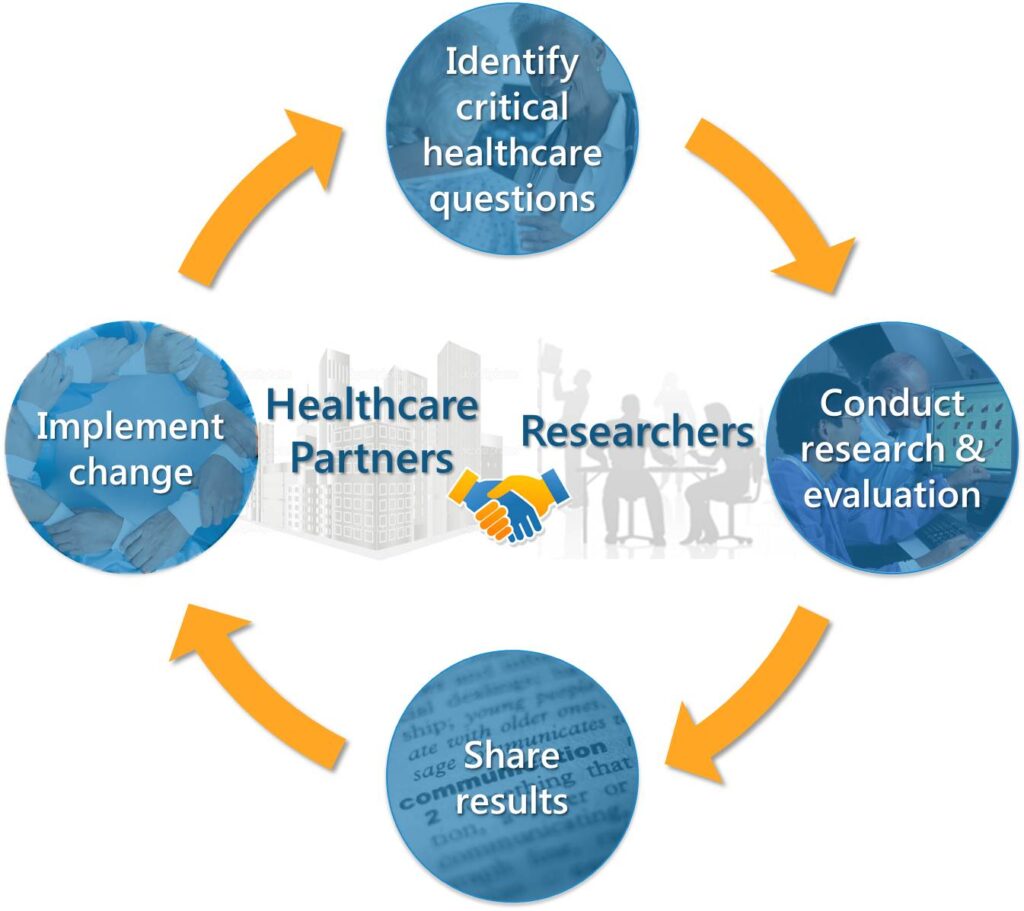Our Mission
To transform healthcare delivery and population health across the state and nation through health systems research that partners University of Wisconsin faculty with healthcare and community organizations.
Toolkits on HIPxChange
Investigators & Staff Received Resources
Million Dollars in Research Funding
Peer-Reviewed Articles
Our Model
The Health Innovation Program (HIP) is a campus-wide program based within the UW-Madison School of Medicine and Public Health. HIP encompasses:
- A community of investigators, staff, and trainees committed to conducting partnered research to improve health and health equity
- Partnerships with healthcare and community organizations dedicated to achieving a common vision of improved service delivery through innovative interventions and rigorous evaluation
- A model of research with partnering organizations that ensures that high-priority questions are asked and answered in a useful way and that the learnings are shared to support organizational change efforts
- Extensive and easily-available data resources that support both high-quality research and evidence-based decision making for health
- An outstanding virtual environment that supports collaboration with colleagues across the nation

Message from Co-Directors

 Each day we face a healthcare system that delivers unpredictable quality at an increasing cost. We currently have only the most rudimentary tools to improve the value of care that is delivered. Collaboration among both researchers and healthcare organizations is critical to develop new tools and drive improvement.
Each day we face a healthcare system that delivers unpredictable quality at an increasing cost. We currently have only the most rudimentary tools to improve the value of care that is delivered. Collaboration among both researchers and healthcare organizations is critical to develop new tools and drive improvement.
As a program in the UW-Madison School of Medicine and Public Health, HIP supports innovation in healthcare practice through providing data resources that support both high-quality research and evidence-based decision making. We also facilitate direct links between University of Wisconsin researchers and our partnering healthcare organizations.
By supporting both research and improvement goals, HIP seeks to reduce the barriers to creating and using evidence to improve healthcare for patients across the state of Wisconsin and the nation.

Our History

2006
HIP is launched with a $2.5 million investment from the University of Wisconsin – Madison School of Medicine and Public Health and multiple community partners to improve health care delivery and population health through health services research that partners UW faculty with Wisconsin healthcare organizations.

2009
The HIP Grant Writing Group is launched to provide investigators early and ongoing feedback on grant development. Since then, over 100 investigators have attended Grant Writing Group sessions, and $38.6 million in funding has been awarded for grant proposals that were discussed in the group.

2010
The first HIP Collaborative Working Groups are launched to bring investigators together to examine health services research and implementation science questions using HIP-sponsored data. Over time, nearly 500 journal articles, presentations, and posters have arisen from projects that have been discussed and supported in HIP’s collaborative working groups.

2012
HIPxChange is launched to accelerate the translation of new and existing knowledge into clinical practice to improve healthcare delivery and health outcomes. Since then, 60 toolkits have been posted and more than 12,000 people from health care organizations, payors, schools, health departments, and other organizations across the globe have downloaded tools from the website.

2012
HIP co-sponsors its first annual statewide learning event with the Wisconsin Collaborative for Healthcare Quality. Over time, the learning events, which use the participating organizations’ own data to drive improvement, have focused on topics driven by WCHQ member and funder priorities, and have had hundreds of participants from healthcare organizations, insurance providers, and community health organizations across the state.

2013
HIP partners with the Wisconsin Institute for Healthy Aging to launch statewide diabetes self-management workshops. Since then, over 300 workshops have been held in 56 Wisconsin counties/tribes, including 26 workshop in Spanish, to help over 3,200 people with diabetes learn how to better self-manage their disease.

2015
HIP hosts a Learning Health System conference for leaders from universities across the country through an AAMC Learning Health System Research Champion Award. At the conference, speakers from UW and UW Health shared details of their efforts to build an academic learning health system by integrating quality improvement, professional development, and research.

2018
A HIP-developed scoring system is fully integrated into the UW Health electronic record. HIP investigators used machine learning and an innovative statistical framework to identify patients who are likely to benefit from care coordination and case management programs.

2019
The Wisconsin Collaborative for Healthcare Quality (WCHQ), in collaboration with HIP, developed the first Wisconsin Health Disparities Report to identify where disparities in health outcomes and care exist In Wisconsin and to help inform and accelerate programs that are working to eliminate disparities. View the concluding results of the report with the Infographic. View the detailed methodology, measure definitions for all WCHQ measures, and tables including performance and denominator data for all measures stratified by race/ethnicity, payer and rural/urban residence in the report Appendix.

2020
The Wisconsin Collaborative for Healthcare Quality (WCHQ), in collaboration with HIP, developed the first 2020 Wisconsin Health Disparities Report: Rural and Urban Populations to identify where disparities in health outcomes and care exist in rural and urban areas in order to inform and accelerate programs that are working to eliminate health care disparities. The report presents six new and distinct rural and urban groupings: Rural Underserved, Rural, Rural Advantaged, Urban Underserved, Urban, Urban Advantaged. The Infographic shows the concluding results of the disparities report. The Appendix contains detailed methodology, measure definitions for all WCHQ measures, and tables including performance and denominator data for all measures stratified by the six rural and urban groups.

2022
Healthy Metric brings together the two medical schools and the Wisconsin Collaborative for Healthcare Quality (WCHQ), the Wisconsin Health Information Organization (WHIO), and Marshfield Clinic Research Institute (MCRI) to releasing new brief reports focused on health disparities in Wisconsin. The first five reports from Healthy Metric provide an initial look at the impact the COVID-19 pandemic has had on health and health disparities. The reports cover a wide range of issues impacting health outcomes and health care in Wisconsin including:
- Disparities in Colorectal Cancer Screening
- Disparities in Blood Pressure Control
- Disparities in Diabetes Control and Outcomes
- Disparities in Use of Benzodiazepines and Opioids
- Disparities in Initial Opioid Prescribing
View all reports here: https://healthymetric.org/reports
Our Funding
HIP investigators have externally-funded research programs with funding primarily from AHRQ, NIH, and PCORI.
In partnership with the Institute of Clinical and Translational Research, HIP has created research resources to support early-stage investigators interested in health services research, and many investigators have career development awards that are supported by matching funds from HIP.
HIP also receives funding from the Wisconsin Partnership Program and UW Health to support health services research that directly benefits the citizens of Wisconsin. More recently, HIP created an analytics resource for the UW Health Accountable Care Organization.
